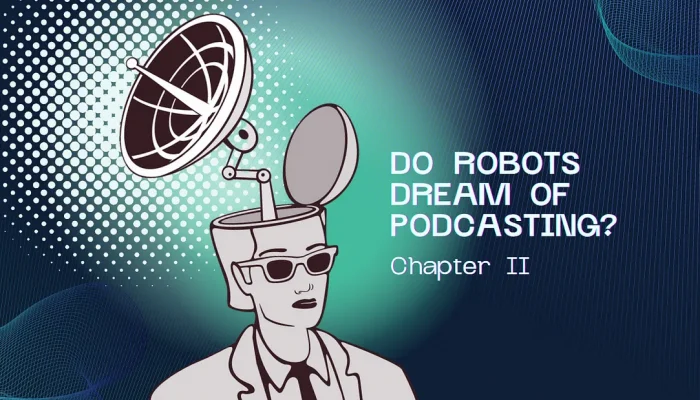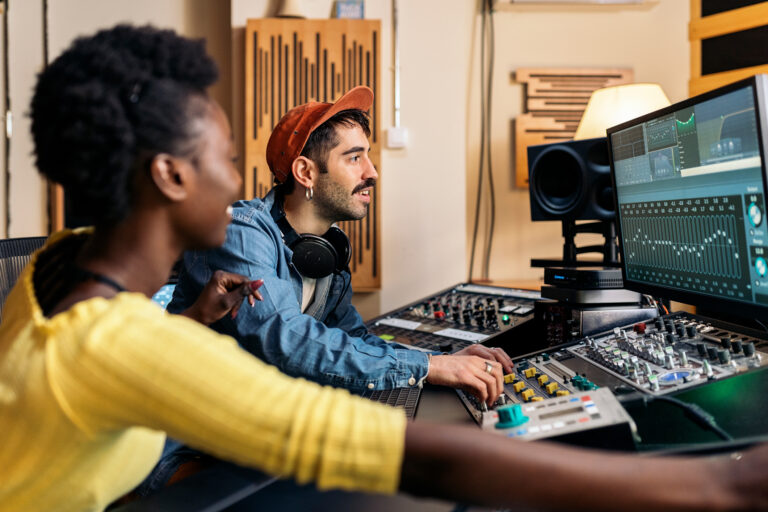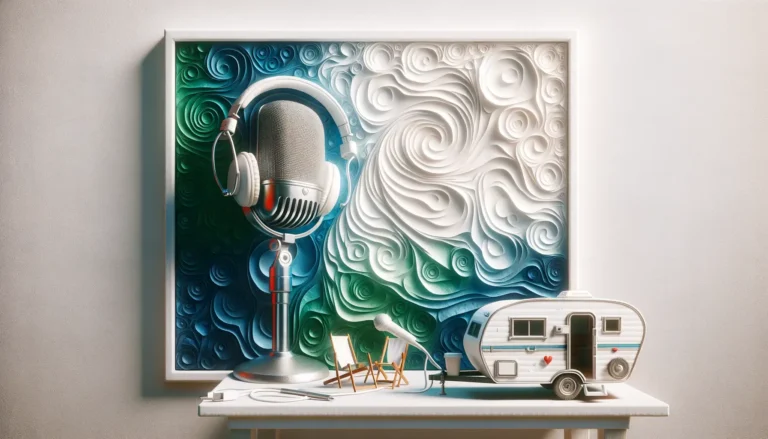Zardoz is one of my favourite movies of all time.
It’s a really, really, bad movie.
It was John Boorman’s next project after Deliverance. Stanley Kubrick was rumoured to have consulted on it, which is much more surprising than the rumour about rampant drug use during the making of the movie. That, at least, explains some of the, um… choices.
A post-apocalyptic allegorical riff, Zardoz foretells how humans would devolve if artificial intelligence served all our needs and granted us eternal life. With this gift of eternal life, humanity grows bored, and corrupt, and descends into madness. Thanks, AI.
Despite the distraction of 007's loincloth, it does make me think about how we currently seem to be bouncing between reverence for, and fear of machine-learning robots.
Last year around this time I wrote an optimistic love letter about what AI could do for us in the world of podcasting. In late 2022 the internet supported its first thirsty backlash against AI. Writers being replaced by AI is a hot debate topic now, and AI art generators are being rightly accused of deriving their artistic ‘creations’ from the works of artists without compensation.
(I empathize with these concerns and fears. The U.S. legal system is getting involved and one hopes there might be some guardrails set up around rampant AI exploitation.)
Are They Coming For Us?
I know what it’s like to worry about being replaced by robots. It’s loomed over me since LANDR arrived in 2014. It’s an automated audio mastering robot that uses AI to distill thousands of mastered songs and mastering engineer workflows into an automated, cloud-based process. I had just helped my friend Brock McFarlane build his first mastering studio and now a robot was threatening to use AI to master audio for pennies.


Why were we investing all this time and money into a real live mastering studio if folks would soon be getting a robot to do the work? Were we setting ourselves up for failure?
The thing is, LANDR found a niche and filled it beautifully. Bedroom electronic producers had all the tools to do everything themselves, except the dark art of mastering. Mastering your own music is like cutting your own hair, it’s the last phase of the production process and should be overseen by an objective professional. LANDR empowered DIY producers to get better-sounding masters to market without breaking the bank.
Here we are nine years later, Elisa Pangsaeng has joined Brock, and they still have clients who need and love their services. Inconveniencing electrons through real analogue audio equipment with a human brain at the helm is still a thing.
So, now that AI has evolved into audio realms like restoration, reverb removal, mouth click disappearance, and other signal processing tasks… am I worried about being replaced?
I am not, because I’ve figured out the perfect defence against the robots replacing me: innovation.
Time Machines
In the audio world, time is a finite resource. We usually receive the audio files we need at the end of the process, and are on the hook for any earlier delays in production. Most of my colleagues in audio post production have shared this experience: you finish a project, happy with the results, but are stuck wondering about all of the tweaks you would have made if you had more time.
AI can give us time.
We put a ton of time into meticulously cleaning up our guest recordings. We strive to get the best results possible out of the gates, but inevitably some issues pop up. The sounds of refrigerators, air conditioners, computer fans, kitchen sinks, 10-foot ceilings in a room with no furniture, AirPods, dogs barking, pasty mouths, and popping p’s.
We have masterful, creative sound designers who might spend a third of their allotted mixing time just addressing the un-sexy issues of audio restoration. We’ve innovated on some systems and tools and processes to make it less of a black hole, but we will benefit from offloading some of that work to the robots… especially if it gives us more time.
✓ Time to lean into experimentation and creative work.
✓ Time to A/B things when a wild fork appears in the road.
✓ Time to make those couple of changes that you didn’t have time to do.
I used to baulk and turn my nose up at any audio tool that claimed to do things automagically. “I could do it better myself.”
Auto noise reduction tools couldn’t be as surgical as I could be, because auto-EQ robots could never hear the context of the whole project. I would teach my students and mentees that a preset or shortcut that claimed to be a time saver would never sound as good as when a great engineer tweaks things manually.
Things are different now. The robots have been busy.
So have the humans behind the robots (brilliant people are behind the AI creations after all). And their work is amazing. If a machine that learns took some of the more pedantic tasks off our hands, whatever would we do with our time? I’m glad you asked.
We can figure out how to perfect the reproduction of a 360 space. We started with Binaural. Atmos is next.
We can spend more time tweaking and finessing the emotional content of a scene.
We can have the time to be more involved in pre-production.
We can finesse the music until it supports the story perfectly at every turn.
If we can trust robots to help us, we’ll have more time to innovate.
A New Hope
Tom Webster from Sounds Profitable penned a delightful article outlining how creative folks can embrace the tools to churn out better work.
“Even the smallest tools and advances throughout society have made our lives better, from disposable pens, to salted cod, to nails. Imagine what a tool that helps us craft better ideas might do.”
I mean, it’s not like we can stop it. There are audio restoration AI tools that are finally doing as good a job as we can. At least four companies are providing AI-generated music that we can customize as we see fit. In China, they’ve resurrected a singer’s voice using an AI voice clone and hit 100 million streams.
This year I’m hoping we can use AI to help us innovate the way we sound design our clients’ shows. Using the robot tools for voice clones, audio restoration, and automagically mastering internal production copies will give us more time to perfect spatial audio, sonic branding, multilingual podcasts, and who knows what’s next?
Headphones are making great strides in innovation, all the more reason for us to step up our game and continuously improve.
In Zardoz, the fear is that AI will make humans so complacent that they’ll do terrible things to their fellow citizens out of sheer boredom. As a relentless optimist, I like to imagine a world where our potential to innovate is fully realized before our robot overlords lull us into sleep.
I love audio. I love to play with it and learn from it and I love that I’ll never reach a point where I’ve figured it all out. Perfecting your craft is a beautiful, impossible, lifelong pursuit. Improvement through innovation will fuel this passion for years to come.
Sign up for the Pacific Content Newsletter: audio strategy, analysis, and insight in your inbox.




